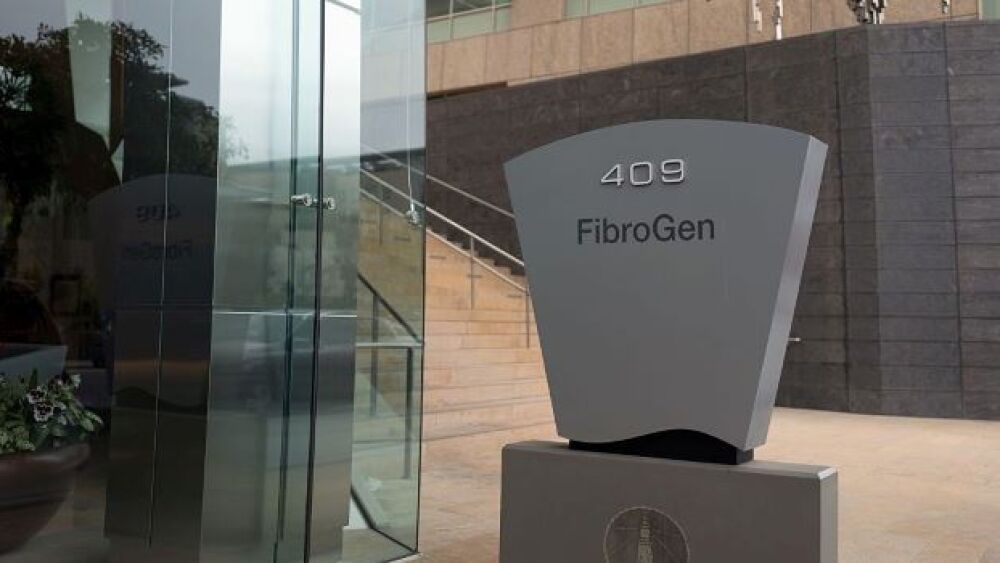In a late-stage study of non-ambulatory patients with DMD on background corticosteroids, pamrevlumab failed to meet the primary endpoint for upper limb performance.
Pictured: FibroGen sign/Smith Collection/Gado/Getty
FibroGen took another hit Wednesday as its lead candidate stumbled in the first round of late-stage results, failing to meet the primary endpoint in a Phase III trial for Duchenne muscular dystrophy in non-ambulatory patients on background corticosteroids.
Up against a placebo in the LELANTOS-1 trial, pamrevlumab missed the primary study endpoint of Performance of the Upper Limb 2.0 at the one-year mark compared to baseline.
While disappointed with the results, CEO Enrique Conterno said in a statement that full results from the trial will be shared by FibroGen at an upcoming medical conference. A second Phase III trial in patients who are ambulatory is also underway, with early results expected in Q3, 2023.
FibroGen has been on a tough road since the FDA rejected its anemia drug co-developed with AstraZeneca in 2021. The regulator cited a need for another clinical trial before the companies could reapply, but FibroGen announced in May that the drug did not meet the primary endpoint in a Phase III study.
Over $55 per share at its highest point in February 2021, FibroGen’s stock took a massive hit with the anemia drug rejection, ending that year down nearly 75%. The stock price has not recovered and was down over 9% at the time of publication following the LELANTOS-1 failure.
Pamrevlumab is designed to inhibit the activity of connective tissue growth factor, as the fibrosis formed by CTGF causes excessive scarring and can lead to organ dysfunction.
FibroGen is testing the antibody in multiple fibrosis-driven indications: Duchenne muscular dystrophy (DMD)—characterized by fibrosis in the muscles, idiopathic pulmonary fibrosis (IPF)—fibrosis in the lung tissue, and locally advanced unresectable pancreatic cancer (LAPC) tumor fibrosis.
All three indications are in Phase III trials, with DMD being the first readout. Topline data from the Phase III studies of pamrevlumab for LAPC and IPF are expected in the first half of and in mid-2024, respectively.
In FibroGen’s first-quarter earnings call, Conterno indicated that a failure in one indication doesn’t necessarily mean it will fail in the others.
“IPF, DMD and LAPC are three very different diseases, all with a common feature of fibrosis, but each with a unique pathophysiology affecting different organs,” Conterno said. “We believe there is limited or no efficacy read-through from one of these conditions to another.”
Previously, pamrevlumab had been tested as an IV infusion in hospitalized COVID-19 patients. The study is listed as “terminated due to low enrollment.” The very limited study results posted showed no benefit over placebo for patients in terms of ventilation, discharge without oxygen and other outcomes when treated with the antibody.
Kate Goodwin is a freelance life science writer based in Des Moines, Iowa. She can be reached at kate.goodwin@biospace.com and on LinkedIn.






